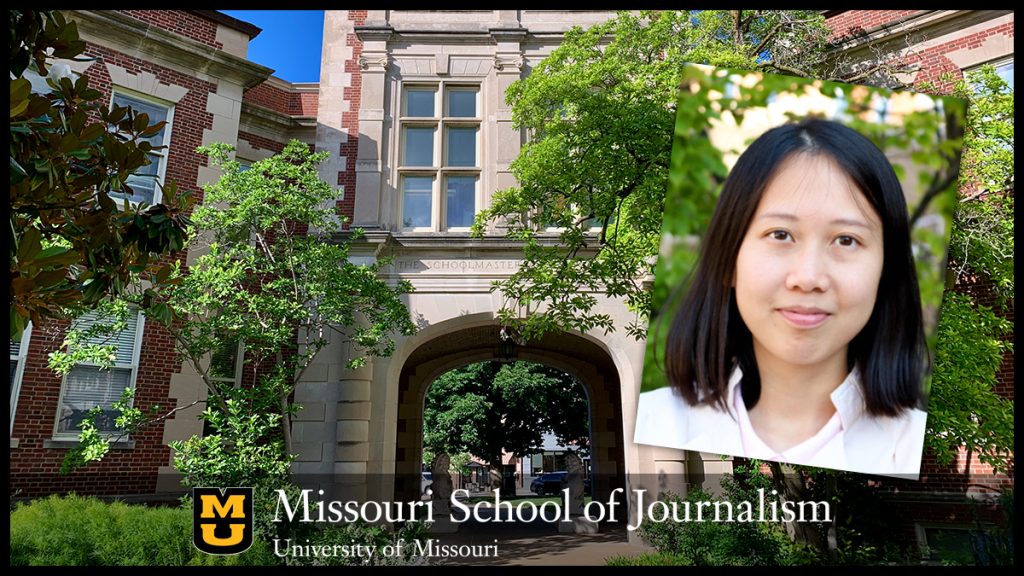Chau Tong brings ‘big data’ to Missouri School of Journalism

COLUMBIA, Mo. (Aug. 7, 2023) — Chau Tong arrives at the Missouri School of Journalism in August as an assistant professor of big data, the large and complex data sets she uses to study the relationships between technology, digital platforms and communication.
“Chau reveals a deep understanding of the human impacts of technology in her work, impacts that matter greatly to the communities we serve as journalists and strategic communicators,” said David Kurpius, dean of the School of Journalism. “From digital misinformation to biases in algorithms, she shows communicators how to maximize the benefits and reduce the harms of technological innovations.”
It’s a field of study that is always relevant — from pen and paper to typewriters, fax machines and computers, journalism and communication more broadly have always made use of technology — but the field has become more prominent recently as chatbots trained on machine-learning models have demonstrated the ability to write headlines and even some news stories.
For Tong, however, studying the intermediaries between people and the information they need was a natural result of her interest in how the public receives information. Born and raised in Hanoi, Vietnam, she knows what it’s like to live without a free press. Her first job in journalism was an internship with the Vietnam Financial Review, an English-language publication for which content is approved by the country’s Ministry of Finance.
“I have this fascination with how different it is back in Vietnam and in the United States,” Tong said. “In Vietnam, the media is controlled by the State. There are some websites we can’t access, and a lot of the news is about the activities of the party. So I’m very interested in this other, totally opposite picture of news media and democracy, where the idea is to bring knowledge to the citizens and serve a watchdog role.”
But even with a free press, news, advertising and public relations messages don’t always reach people without first being filtered through the lens of social media, the political leanings of the audience and search engine algorithms that choose which information to prioritize. Using advanced data collection and analysis methods as a postdoctoral associate at Cornell University, she has explored how public opinions about polarizing issues like the COVID-19 pandemic and the Black Lives Matter movement have been influenced by these and other factors.
At the same time, she has examined ways in which data science can be used to combat inequities in information access by identifying misinformation and countering the influence of technology that keeps people in so-called “filter bubbles:” social media and search engines that show people what they want to see, not what they need to see.
Big data, small world
As part of a group of researchers who will work with the School of Journalism’s Donald W. Reynolds Journalism Institute (RJI) to produce impact-driven research for the benefit of local news organizations around the country, Tong brings a valuable strategic communication and data-focused perspective to the team.
“Finding ways to efficiently make use of the various datasets and analytics that are in plain sight is an important and challenging assignment,” said Randy Picht, executive director of RJI. “Chau is the right person for that assignment and I’m looking forward to working with her.”
Tong’s work will dovetail neatly with other researchers who collaborate with RJI, including Damon Kiesow, who is working with the MU Institute for Data Science & Informatics (IDSI) to create an innovative approach to addressing news deserts. Kiesow and IDSI are developing an algorithm that can conduct large scale-analyses of the quality of news coverage in a given area.
In fact, Tong will serve a dual role working in IDSI alongside her position at the School of Journalism, and she will teach classes for both. For journalism students, she will be teaching an emerging technologies course that helps students learn to integrate new, cutting-edge technologies like machine learning into their work.
“I’m very impressed by the students,” Tong said. “I feel like teaching at the School will have a broad impact, just from seeing the graduates going into broadcast and newspapers all over the country. It’s going to be a rewarding, enriching experience.”
Tong earned her bachelor’s degree from Hanoi University in 2009 before moving to South Korea for a master’s in communication from Ewha Womans University, which she earned in 2013. Her doctorate in mass communications came from the University of Wisconsin-Madison in 2021.
Updated: August 8, 2023